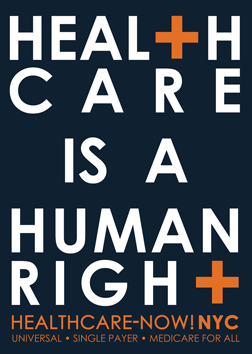Now is the time to build a movement in support of single payer, a health care system that would provide care to all while drastically cutting health expenditures and eliminating medical bankruptcies. With the constitutionality of the Affordable Care Act being deliberated, there is ample opportunity for single-payer supporters to present their case for this healthcare system. At present, there is a New York State single-payer bill, and if single-payer and Occupy activists can coalesce around this issue, great progress can be made.
Contact Us
Email Updates: Sign up to receive announcements for upcoming events.
Support Us
Donate: HCN NYC thrives on the generosity of contributions from our supporters.Find Out More
Q & A: Check out our user-friendly F.A.Q. Guide to the NY Health Bill. Monthly Meetings: Get caught up on the latest actions, events, and information.Join Us on Facebook

